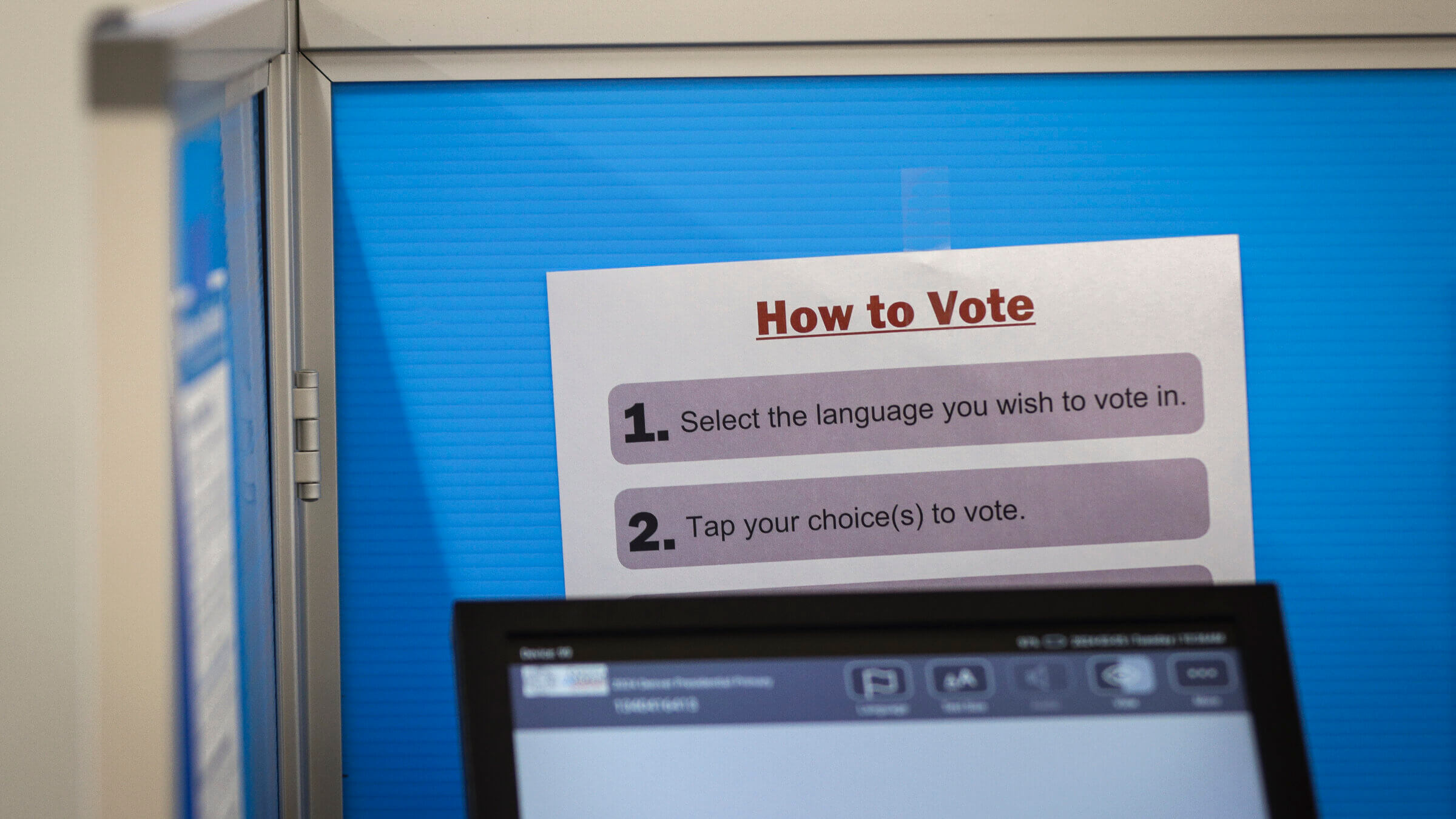Need help voting in Yiddish (or Urdu or Tagalog or Gujarati or Polish or Russian or Tamil or Hmong)?
Election Day is a time to marvel at the linguistic diversity of the American Electorate

Directions on how to vote in a voting booth. Photo by Getty Images
As I waited nearly three hours to vote early in Chicago, the one highlight was watching the Language Assistance guy.
He was a tall young Indian guy with a great head of hair, wearing a maroon sweatshirt and black sweatpants, and he constantly scanned the line for those who might need help.
My brother happens to speak Hindi, I told him, as I asked which languages were listed on his Language Assistance tag.
“Hindi, Urdu, and Punjabi,” he said proudly.
Then he darted away as an elegant man came into view, carrying a cane. First, the Language Assistance guy offered him expedited voting, which is apparently the policy for disabled voters stuck in very long lines. Then, the Language Assistance guy tried his Hindi.
“I speak Tamil,” the man with the cane replied, in English.
I smiled.
No matter how prepared the Language Assistance folks are — the Spanish-speaking woman was also in hyper-efficient mode — someone comes in with a language that isn’t listed.
Luckily, in this case, the man who spoke Tamil could vote in English. I wondered if anyone on this long line, stretching around and around a gym in a National Guard armory, knew that the history of language help dates to the landmark Voting RIghts Act of 1965.
In 1975, Congress amended the Voting Rights Act of 1965 to include the “Language Minority Provision.” The idea was to ensure that every American had access to the electoral process, no matter what level of English proficiency they possessed.
The provision was reauthorized in 1982 and 1992, and again in 2006, during the Bush Administration, for the next 25 years.
But in practice, language assistance depends on where you go — and it’s worth checking that out in advance with your state or city election board. According to the US Election Assistance Commission, “as of 2021, Federal law requires over 330 jurisdictions to provide some type of language assistance.”
“Any county with more than 10,000 residents whose native language is not English and who indicated on their U.S. Census form a lack of proficiency in English, is required to provide election materials in the identified languages,” the Los Angeles County clerk’s website explained. Multilingual Services Program.
“A language is considered to be covered by the VRA [Voting Rights Act] as mandatory for the County’s translated election materials if (1) more than 5% of the citizens of voting age are members of a single language minority and are limited English proficient OR (2) more than 10,000 of the citizens of voting age are members of a single language minority and are limited English proficient.”
It’s interesting to see which cities help with which languages.
Chicago is ready with Hindi, but New York is ready with Yiddish, and also with Arabic, Bengali, Chinese (Cantonese, Mandarin), French, Haitian Creole, Italian, Korean, Polish, Russian, and Urdu.
In Chicago, “select ward and precinct voting locations will have assigned bilingual poll workers and paper ballots in Spanish, Chinese, Hindi, Korean, Tagalog and Polish,” according to the Chicago Board of Elections.
“Additionally, every precinct polling place in the city will have a touchscreen voting machine and audio ballot in 12 languages: English, Spanish, Chinese (audio in Mandarin dialect), Hindi, Korean, Tagalog, Polish, Gujarati, Urdu, Ukrainian, Arabic and Russian,” Chicago public television station WTTW reported.
Voters whose language is not listed can bring someone to help them at the polls, but not just anyone — that person can’t be their employer or union representative.
I passed my time on the line reading up on language options in various states.
Minnesota, for example, offers language assistance in Oromo and Hmong among other languages. One of the most impressive language lists available to voters is in Los Angeles County, where 18 languages are listed.
It’s incredible to consider the linguistic diversity of the American electorate.
But what if a speaker of a language other than English gets to the polls, and the promised help is not available? Or what if the voter’s language just isn’t spoken by anyone at the polls?
As an English speaker, you may witness this, as I did, in 2016, in which case you can make a call for help.
The non-partisan Election Protection Hotline at 1-866-OUR-VOTE 866-687-8683 helps with issues at the polls — including language issues. It is run by the national non-partisan Election Protection Commission, which also runs hotlines in some additional languages:
Spanish/English 888-VE-Y-VOTA 888-839-8682
Asian Languages/English 888-API-VOTE 888-274-8683
Arabic/English 844-YALLA-US 844-925-5287
As I waited in line for hours, chatting with a worried Latino architect and a smiling bearded guy who kept telling us that he and his husband were going to their cabin in Wisconsin to hide out from all the election news, I kept searching for election assistance in Hebrew; I couldn’t find any.
But hey, if you’re near me on Election Day, and need some help with Hebrew, send a note. I’ll rush over — or find someone who can.
A message from our Publisher & CEO Rachel Fishman Feddersen

I hope you appreciated this article. Before you go, I’d like to ask you to please support the Forward’s award-winning, nonprofit journalism so that we can be prepared for whatever news 2025 brings.
At a time when other newsrooms are closing or cutting back, the Forward has removed its paywall and invested additional resources to report on the ground from Israel and around the U.S. on the impact of the war, rising antisemitism and polarized discourse.
Readers like you make it all possible. Support our work by becoming a Forward Member and connect with our journalism and your community.
— Rachel Fishman Feddersen, Publisher and CEO






























